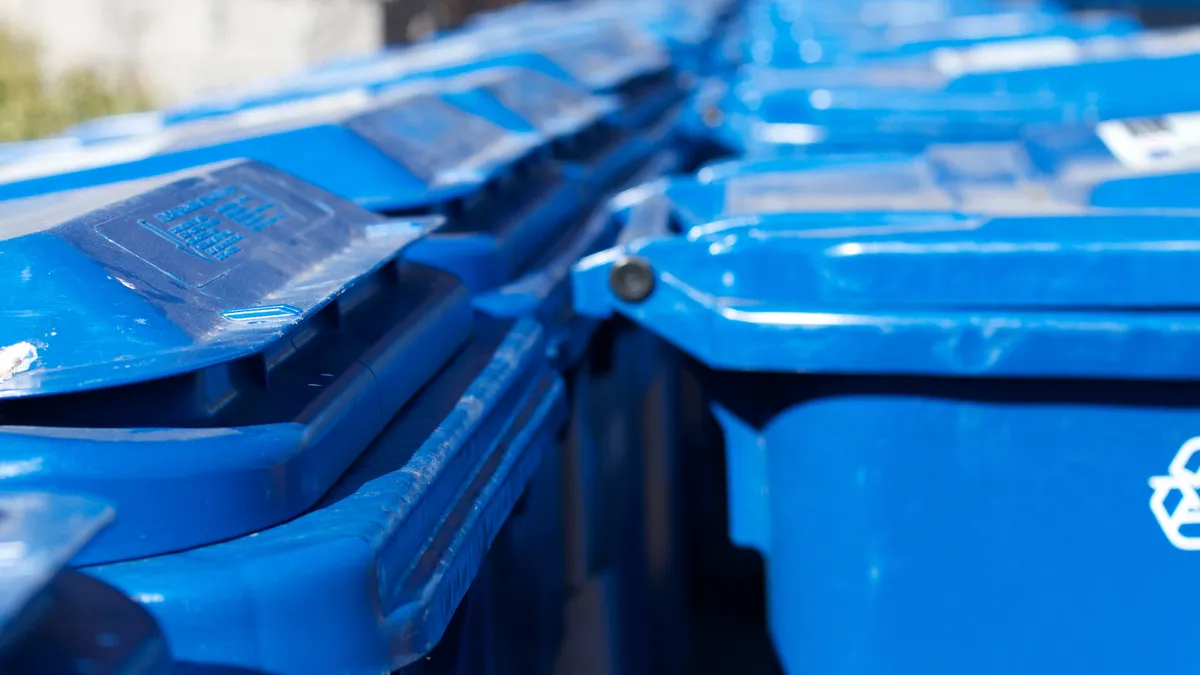Dive Brief:
- Prince William County, Virginia — a suburb of Washington, D.C. — has asked residents to stop putting glass and #3-7 plastics in their curbside carts, and haulers to stop collecting the materials, effective immediately.
Effective immediately, Prince William County is asking residents and refuse haulers to eliminate glass and some plastic containers from curbside recycling collection. https://t.co/xnWm04m6OO pic.twitter.com/GX1HTGDnzS
— Prince William County (@pwcgov) March 26, 2019 - Officials requested the glass change because the material is being landfilled, rather than recycled, after going through local MRFs. They're working to add glass drop-off bins at the county landfill by next month, at which point the collected glass will be crushed and used in construction projects.
- Officials requested the elimination of all plastics except #1 and #2 plastic bottles and jugs due to China's tightened contamination standards and ban on certain recyclable material imports — including mixed plastics.
Dive Insight:
Curbside collection services in Prince William County are provided by 10 private haulers permitted by the county, Recycling Program Manager Scott McDonald told Waste Dive.
"These companies are required to collect cardboard, newspapers, mixed paper, plastic bottles and metal cans materials source-separated by residents for recycling on a weekly basis," he said.
The county also has two MRFs within its borders: the Northern Virginia Recycling Center, operated by Republic Services, and the American Recycling Center, operated by Waste Connections subsidiary American Disposal Services. In addition to materials collected curbside, the American Recycling Center handles the recyclables collected from the county's 18 material drop-off centers. Some of the haulers also use Waste Management-owned facilities in two neighboring counties.
Prince William County's overall recycling rate stood at 34.6% in 2017, which is above a mandated 25% rate but on a downward trend compared to recent years.
A recent county presentation about changing recycling markets detailed a recycling summit held in February, where city officials gathered with permitted haulers and processors to discuss the local effects of China's recyclable material import restrictions and devise potential solutions. Eliminating glass from single-stream recycling programs came up at that time, to be revisited this month.
Despite Prince William County's rather robust material collection and sorting resources, officials say the problem stems from the lack of glass processing facilities in the region. The closest facilities are hours away, in Pennsylvania and North Carolina, making the material unmarketable locally. Neighboring Northern Virginia municipalities, including Arlington — where Amazon is set to build its HQ2 — are also mulling over whether to eliminate glass from their recycling programs due to market challenges.
While the strategy outlined in the recycling presentation calls for investigating greater regional collaboration — including on marketing or devising a common list of recyclable materials — it notes that the complexities of the region make it difficult to get everyone on the same page when it comes to solutions.
Prince William County could have a particularly hard time with that, considering its position between highly urban areas to the east and more rural areas to the west. Areas with different densities typically have different recycling needs and capabilities, and bringing them together into a regional approach takes work. Still, agreeing on a large-scale solution — such as attracting a glass processor to the area — could be beneficial for the entire region and allow municipalities to pool their resources rather than going it alone.
This news is the latest in a series of stories about Virginia communities changing recycling programs or undergoing market challenges in recent months.










